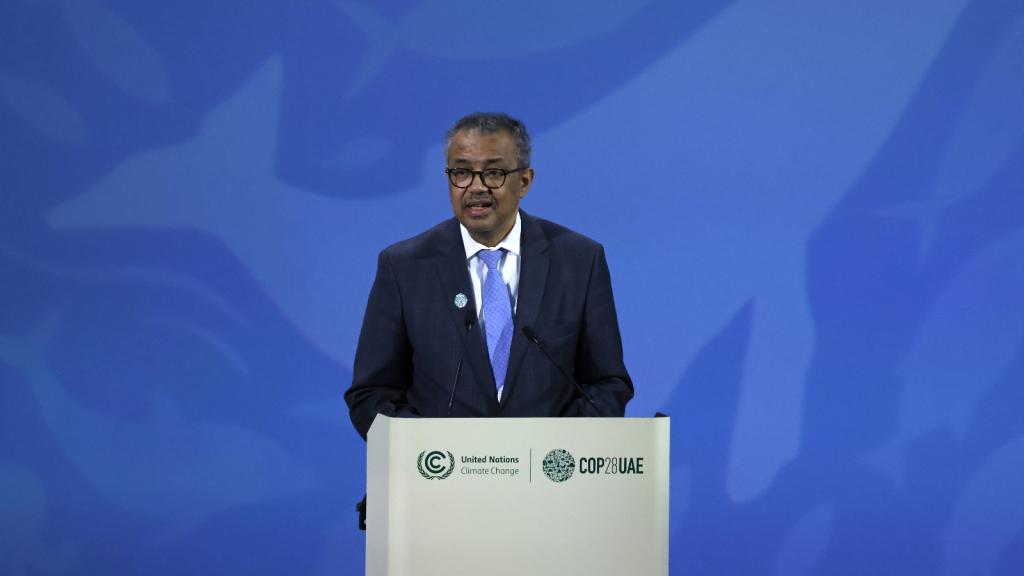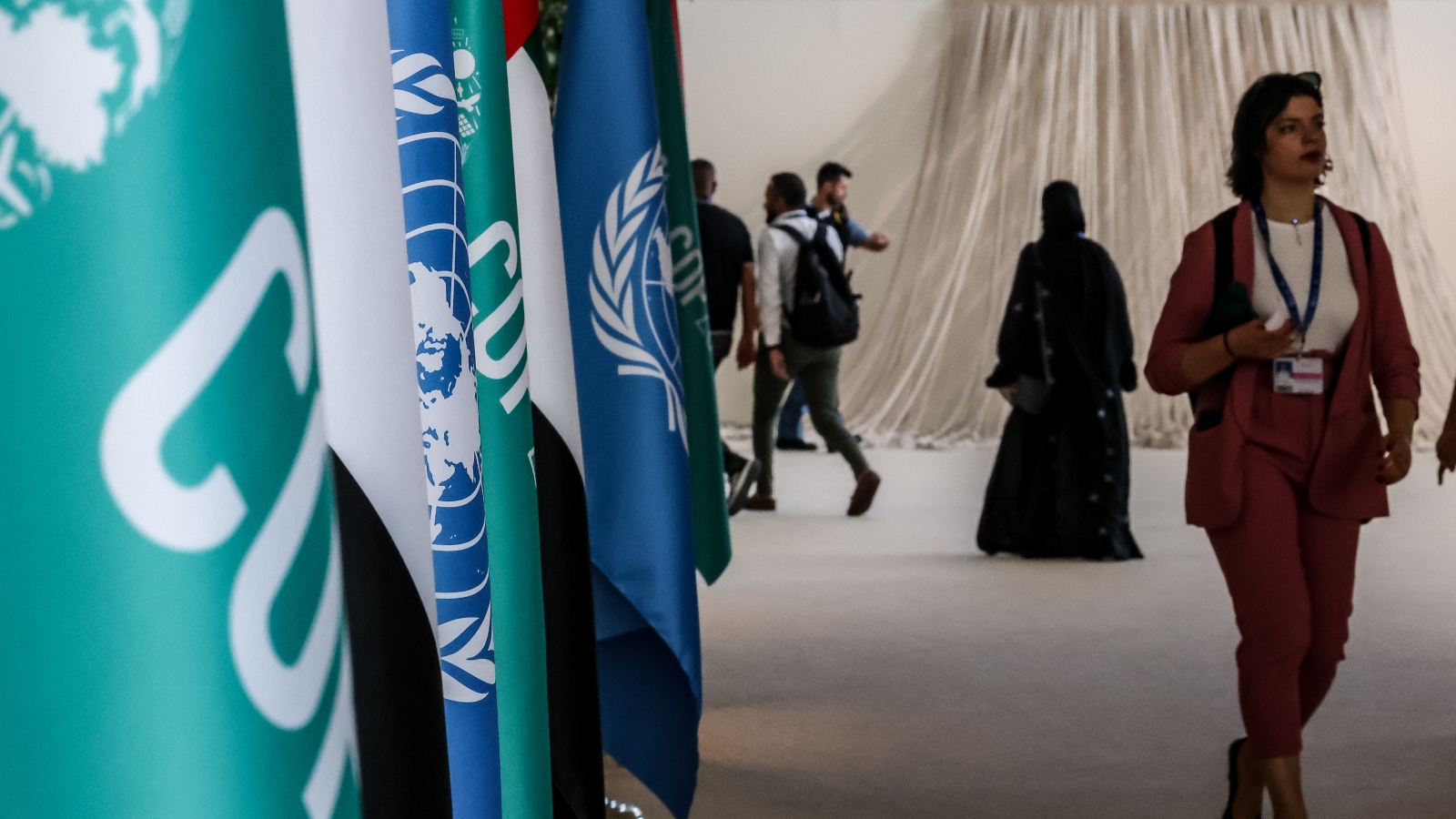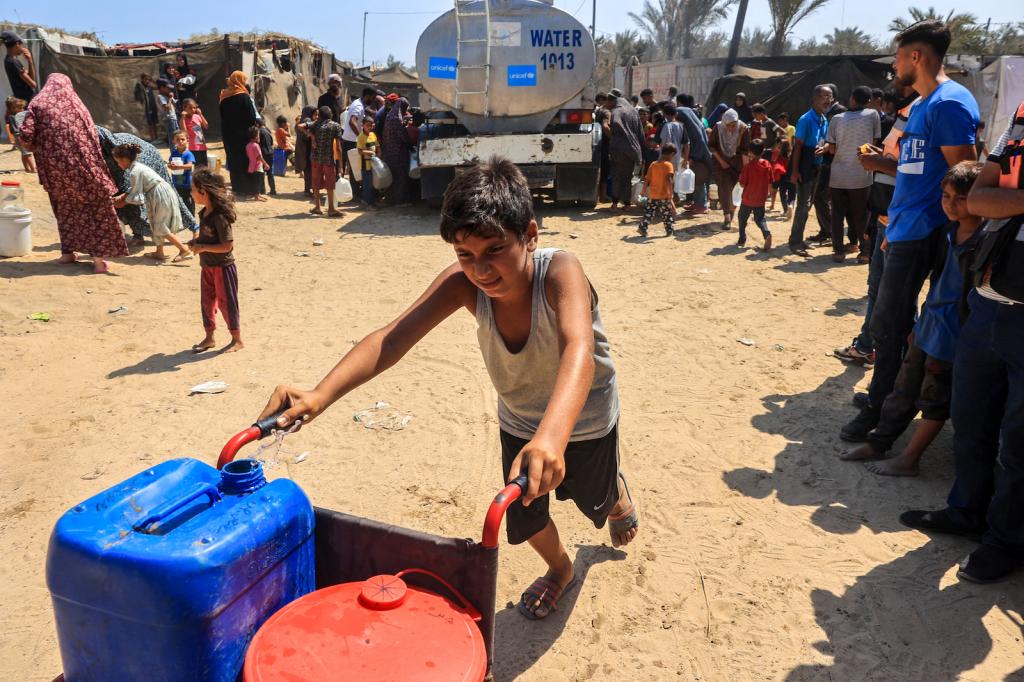As negotiators at the COP28 climate summit in Dubai debate calls for a global phaseout of fossil fuels, a record number of fossil fuel lobbyists have filled the gathering’s hallways and conference rooms: More than 2,400 conference delegates have ties to the fossil fuel industry, according to a new report from Kick Big Polluters Out, a global coalition of more than 450 nonprofits and advocacy organizations that oppose the fossil fuel industry’s influence on climate policy. The data is only available thanks to new transparency requirements adopted by the United Nations at the behest of climate advocates, who have argued that the fossil fuel industry takes advantage of lax reporting standards to push its agenda at the annual COPs.
The sheer number of lobbyists at the conference — about 1 lobbyist for every 40 attendees overall — has disturbed many activists and world leaders pushing for a fossil fuel phaseout. But just as concerning is how little information is available about why these lobbyists come to Dubai. They gain access to the conference under the auspices of national governments that invite them, trade groups that represent their financial interests, and business organizations that their companies are members of, but it’s difficult to know exactly how they try to influence the talks once they arrive. Organizers with Kick Big Polluters Out say that lobbyists use their association with nondescript-sounding trade groups to hide their direct advocacy on behalf of oil, gas, and other industries.
“For us, this undue influence constitutes a form of corruption and should be much better regulated,” said Brice Böhmer, the climate and environment lead at Transparency International, a German anti-corruption organization founded by former World Bank employees. “This is urgent, as it has been delaying and diverting climate ambition and action.”
Many fossil fuel advocates identified in the report are attending as part of national government delegations, and some even work for state-owned corporations that produce oil and gas. More than a dozen members of the Kuwaiti delegation, for instance, are affiliated with the Kuwait National Petroleum Company, an oil refiner owned by the Kuwaiti government. The delegation from Botswana, meanwhile, includes four representatives who are affiliated with a large coal mine that is jointly owned by the Botswanan government and the De Beers diamond company.
A large number of lobbyists are arriving at COP28 with “host country badges,” indicating they are attending as guests of the United Arab Emirates itself. The president of COP28, Sultan Ahmed Al-Jaber, is also the head of the Emirati oil company Adnoc, and several other representatives from that company are attending under host badges. The host country guests also include senior executives from oil field company Baker Hughes, the petrochemical company Oxy, and Saudi Arabia’s state-owned energy company, which refines and exports the country’s vast oil reserves. Perhaps the most notable member of the host delegation is Darren Woods, the CEO of ExxonMobil, who has touted the company’s hydrogen and carbon capture investments while at the conference.
Activists argue that, even when fossil fuel interests are not invited at the behest of national governments, they can disguise their large presence at COP talks by sending their members under a variety of different trade groups and organizations, rather than sponsoring their own delegations. ExxonMobil, for instance, has at least 17 representatives at COP28 other than Woods, but they are all enrolled under groups such as the United States Council for International Business and the International Council of Chemical Associations.
As the trade groups tell it, they’re trying to give their member companies a voice in complex negotiations. Many such trade groups arrive at COP with a list of actions or goals they’d like to see implemented. The United States Council for International Business, for instance, sent an open letter to U.S. climate envoy John Kerry last month that outlined its agenda for the conference. The letter promised that the group would “engage constructively” in talks about how to measure and enforce net-zero pledges, but it also noted that the group was “concerned” that enforcement of those pledges “risks producing a chilling effect on future voluntary climate action initiatives.”
In the eyes of groups like Kick Big Polluters Out, this amounts to deception — after all, the group’s membership includes Shell, BP, and ExxonMobil.
“Trade associations have always been one of the primary ways big polluters influence these negotiations,” said Rachel Rose Jackson, a researcher at the nonprofit Corporate Accountability. “They provide a direct route for them to influence the talks without having to be super clear about who they are.”
Get caught up on COP28
The largest and most influential of these trade groups, with 116 representatives, is the International Emissions Trading Association, or IETA, which touts itself as “a nonprofit business group championing the power of high integrity markets to reach net-zero targets.” The group advocates for the creation of markets that allow countries and companies to buy, sell, and trade carbon offsets to neutralize their own emissions. This carbon accounting is at the heart of many “net zero” emissions pledges, in which a company such as an airline will pay someone to undertake an activity that reduces atmospheric carbon — for instance, by protecting an endangered forest from logging — as a way of canceling out the emissions of the jet fuel it burns to fly its planes.
Among the members of the IETA delegation this year are representatives from BP, Shell, the French oil giant TotalEnergies, and the Norwegian state-owned oil company Equinor. It’s not just oil majors, either: Morgan Stanley, Bank of America, Volkswagen, and the Anglo-Australian mining conglomerate Rio Tinto are also attending under IETA’s aegis.
The fact that so many fossil fuel advocates are attending the conference under the auspices of IETA may be a sign that industry interests see carbon markets as an important part of their long-term business strategy. The creation of a voluntary trading system for carbon offsets would ease some pressure on these companies to reduce their direct greenhouse gas emissions. But new research has cast doubt on the validity of the carbon offsets that sustain these markets: According to one estimate, more than 90 percent of the rainforest conservation credits issued by the carbon market company Verra may not exist at all.
IETA was founded in 1999 by a group of firms that included multiple oil majors, notably BP, and today it is funded by several dozen banks, oil companies, and other large corporations. It now has hundreds of members including Chevron, ExxonMobil, the mining conglomerate Glencore, and livestock giant Cargill. The association describes itself as a “purely business” lobbying effort, but Corporate Accountability says it “exists to ensure that climate policies don’t negatively impact the profits of Big Polluters.”
A spokesperson for IETA declined to discuss the identity of individual delegation members.
This is far from the first time that IETA has dominated a U.N. climate conference. In 2005, it sent more than 400 delegates to the conference in Montreal at a time when the average size of a government delegation was just 22 members. In turn, IETA emerged with a big victory as countries agreed to formalize a carbon-trading scheme. Andrei Marcu, an early president and CEO of IETA, advised the national delegation of Panama at COP23 in 2017, attempting to influence the country’s engagement in climate talks even as he also pushed the interests of big oil companies. And at the 2019 conference in Madrid, the body sent 129 delegates, some of whom handed out pins that said, “All I want for Christmas is Article 6,” referring to an item in the Paris agreement that lays the groundwork for a global carbon market.
The stakes at COP28 are high. After years of work, negotiators hope to reach a global consensus about what offset projects should count under the U.N.’s Article 6 carbon market and about how to monitor the long-term success of offset projects. In a position paper released ahead of the summit, the IETA noted that this year’s Article 6 negotiations presented “the opportunity to avoid extreme politicization and focus on key decisions.”
Bohmer, of Transparency International, said that the new reporting requirements will make this year’s COP somewhat more transparent than previous ones, but he argued that there’s still room for lobbyists to push their own agendas at the talks.
“Some of the requirements are optional and declarative,” he said of the new standards. “This is far from a framework allowing the detection and management of conflicts of interest.”




